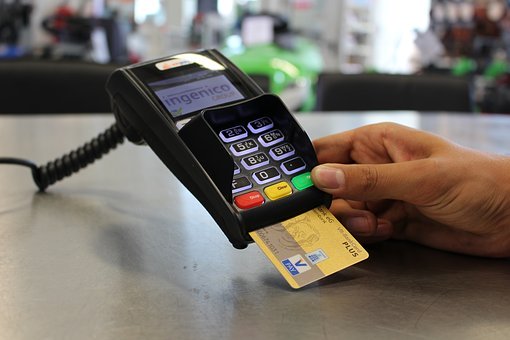The understanding of average credit card merchant fees is essential for business owners. Merchants and customers pay billions of dollars in processing fees every year and so it is essential you know what to expect.
Up next we’re going to give you a breakdown of fees that merchants have to pay when their customers use credit cards to pay. You’ll read in this article what kinds of fees to anticipate and how they add up.
Although not exact, the numbers will give you a reference point so you can plan your costs for the year. Read on to find out more so you’re not surprised when it comes time to pay up.

What Are Average Credit Card Processing Fees?
Credit card companies charge approximately 1.3% to 3.4% of each credit card transaction in processing fees.
The actual number depends on the business’ payment network (e.g., Visa, Mastercard, Discover, or American Express), credit card type, and merchant’s category code (MCC).
Below are the average credit card fees for using the following four payment networks.
- Visa – 1.29% + $0.05 to 2.54% + $0.10
- Mastercard – 1.29% + $0.05 to 2.64% + $0.10
- Discover – 1.53% + $0.05 to 2.53% + $0.10
- American Express – 1.58% + $0.10 to 3.30% +$0.10
Such fee categories include the two types of fees charged for each transaction by the payment networks: interchange and assessment fees. They do not include payment processing fees, as fee rates differ significantly depending on the chosen payment processor.

Credit Card Fees That Affect Rates
Now, take a closer look at the fees that get taken out of every credit card transaction.
Interchange Fees
The credit card issuing bank receives the interchange fee. For instance, if you have a Chase credit card on the Visa payment network, Chase will collect the interchange fees for your transactions.
Interchange fees are intended to help the card-issuing bank cover specific issues like the risk of authorizing the sale, fraud, and cost of handling. It shouldn’t be strange that the factors influencing these rates somehow relate to the risk the card issuer is taking on.
Here are the average credit card interchange fees.
- Visa – 1.15% + $0.05 to 2.40% + $0.10
- Mastercard – 1.15% + $0.05 to 2.50% + $0.10
- Discover – 1.40% + $0.05 to 2.40% + $0.10
- American Express – 1.43% + $0.10 to 3.15% +$0.10
Assessment Fees
The assessment fee is paid to the payment network. In the above case, Visa will be given the assessment fee for each transaction where you used your Chase Visa card.
Assessment fees are different from interchange fees because they are charged on the basis of total monthly sales rather than individual transactions. Usually, they are smaller than the interchange fees.
The amount of assessment fees depends on the network, which varies on factors like whether the cards used were credit or debit, the number of transactions, and how international transactions were handled.
See credit card assessment fees for the four payment networks below.
- Visa – 0.14%
- Mastercard – 0.1375% (for transactions under $1,000); 0.01% (for transactions of $1,000 or more)
- Discover – 0.13%
- American Express – 0.15%

Payment Processing Fee
Even when merchants are required to pay the interchange and assessment fees required by payment networks, they are more flexible with payment processors.
It is billed to the entity that accepts the credit card payment and transfers the transaction to the payment network through either a physical card reader or an electronic payment gateway.
Costs for this service may be in one of the following: a per-transaction charge, a monthly service fee, and the price of the equipment being used to conduct payments. These are depending on the payment processing company.
Interchange-plus, flat rate, subscription, and tiered are the available payment processing models. Know how each model works and the fees you’d pay with several popular payment processors here.
Conclusion
As credit cards grow in popularity, these fees are merely the cost of business. Realizing how much you’re going to pay for each transaction helps you make the right price for your products and ensures you make enough money for each sale.


